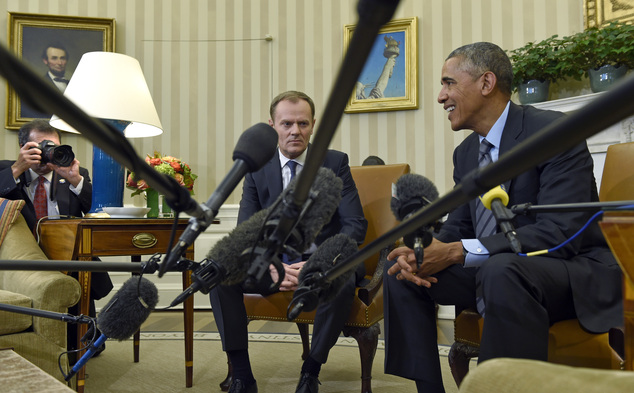
In his first visit to Washington in his capacity as President of the European Council, Donald Tusk met with President Obama and Vice-President Biden today, March 9th, 2015. Over his two-day visit to the American capital, Donald Tusk seeks to solidify the EU’s relationship with the US. In addition, President Tusk will visit the Holocaust museum tomorrow, March 10th, in order to send a message of reconciliation to Europe’s Jewish community after the recent rise of anti-Jewish sentiments.
The agenda discussed between the two transatlantic leaders covered the following issues: Russia and the crisis in Ukraine; the situation around the Mediterranean with Syria, Libya and the consolidation of the Islamic State (IS); and naturally the negotiations over the Transatlantic Trade and Investment Partnership (TTIP). This comprehensive agenda underscores an interesting paradigm: each crisis is regional for the EU with serious international repercussions.
On the case of Ukraine and the role of Russia, the Europeans and Americans share the visions of the problem as it is a direct threat to the old concept of national sovereignty and territorial integrity. However, the Europeans, as expressed by President Tusk prior meeting with President Obama, are not willing to deepen the sanctions against Russia. There is a lack of unity among the EU-28 for domestic political reasons – like in Italy and Greece – and strong lobby groups in France, Britain and Germany – weapons, energy and finance – fearing a deepening in the tensions between the EU and Russia. From a personal standpoint, President Tusk, a former Prime Minister of Poland, has much more hawkish view of the problem and tends to emphasize the role of NATO.
The Mediterranean region is becoming one of the hottest part of the world. Geopolitics are moving fast and looking dire from Europe. The war in Syria seems unattainable, and the consolidation of IS in Syria, Iraq and now Libya is of great concerns for the EU. With a number of failed-states causing a regional vacuum, IS has found its territory to implement its strategy and vision. IS is attracting young Europeans, leading Europeans to conduct terrorist attacks against other Europeans, as well as widening its territorial control in the Middle East. President Tusk told reporters on March 9th, that “We [Europeans] must help because we cannot have a failed state run by warlords and anarchy — sitting in anarchy just 100 miles off the southern coast of Europe.” The power vacuum left after the fall of Gaddafi in 2011 had not been filled until the arrival of IS. Now IS is at the doorstep of Europe.
In the case of the TTIP, the negotiations initiated in 2013, are moving into their their year. It was supposed to be a mega-free trade deal, quickly signed, allowing further harmonization and lowering tariffs, allowing to bail-out the European economies, and ultimately boosting up the transatlantic economy. The TTIP is a way for the US and the EU to compete with the rise of new powers like China, India and Brazil. But instead a quick agreement, the negotiations have become more complex and Europeans have increased a certain numbers of concerns about the consequences of such FTA on their lives. Several issues are of concerns for Europeans: first, the lack of transparency in the negotiation process; second, lowering standards on health and food regulations (on Genetically Modified Food or even chlorine washed chicken); third, investor-state dispute settlement mechanisms (ISDS); and last, a certain opposition to globalization and American capitalism. If Americans and Europeans want to have the TTIP agreed, it will need to take place in 2015 otherwise it could look like the endless WTO’s Doha Round.
The transatlantic relationship is one of the world’ strongest and this high-level visit by President Tusk demonstrates that the EU and the US see eye-to-eye on foreign and economic policies. The degree of interdependence and interconnection between the two sides of the pond is such that the US cannot ignore what is happening at the doorsteps of Europe, and the Europeans have to realize the importance of the alliance with the US in order to assure its security.
(Copyright 2015 by Politipond. All Rights Reserved. This material may not be published, broadcast, rewritten or redistributed without permission).